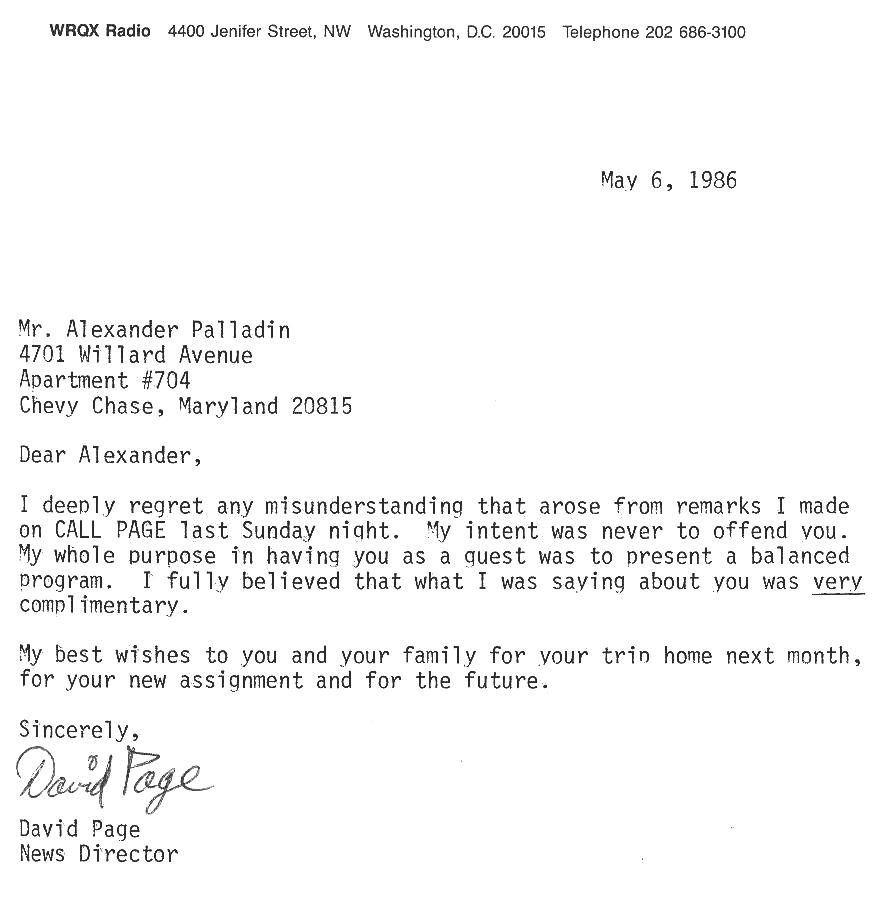
In September 1973, I started working as a Soviet reporter in Canada. That was my first travel to the West as an adult.
At the beginning my Canadian acquaintances would often inquire, “Do you feel a cultural shock?” Lots of things, quite understandably, seemed peculiar to me and my wife. However, we took them in stride and adapted to local ways of life without any major problems. The following account will deal with a different cultural shock.
A week after the Chernobyl tragedy, on May 4, 1986, I was invited to provide relevant comments on Washington-based WRQX radio station. The program was hosted by WRQX news director David Page. Two years before that he had won the annual United Press International award for the best news radio broadcasting.
Our radio talk, followed by Q&A session with callers, lasted for about 30 minutes without a hitch. David Page treated me fairly, and during commercial breaks I told him that in summer I would terminate my 5-years long assignment in the USA and would go back home with my family on board a Soviet ship.
On my way from WRQX studio I switched on the car radio. David Page was still on the air and I was shocked to hear his mocking remark, “Russian journalist Alexander Palladin, who was my quest a while ago, told me that he will be shipped out of our country pretty soon.”
This reminded me of another Washington-based radio station that had poked fun of Mstislav Rostropovich when he accepted an invitation to be their guest speaker. In 1974 he and his wife, soprano opera singer Galina Vishnevskaya, left the USSR and settled in the US capital, where he became the conductor and artistic director of the National Symphony Orchestra. In the West they both continued their professional careers coupled with some anti-Soviet activities. Thus, during the said radio talk Slava was introduced as both a distinguished musician and an indomitable fighter for human rights.
After some small talk his two hosts suggested that Rostropovich should act as an auctioneer selling… mosquito droppings. Quite naturally, the 58-years old world-famous maestro was perplexed and began to meekishly protest, but not for long. Ultimately, he succumbed and agreed to play a humiliating role in a most vulgar program for the amusement of his radio hosts and their audience.
Besides, on my way home from WRQX studio I recalled a similar story with Istvan Toth, a Hungarian diplomat who had arrived in Washington a couple of years before and was introduced to US officials at a home party launched by the Counselor envoy of Hungary’s Embassy. Istvan had never been to the USA before and was still wearing clothes bought in Budapest.
One of the guests invited to the said party was Richard Birt, the 4th highest ranking official of the US State Department, renowned for his unmatched arrogance even by American standards. He measured Istvan with a haughty glance, broke in mocking laughter and said, “You’d better go tomorrow to buy new clothes. There are a couple of cheap outlets where you’ll find more appropriate wear.” Having said that, Birt proceeded to the bartender to pick up a drink.
Thus, as soon as I returned to my office, I called the WRQX studio and asked to be connected with my recent interviewer. As soon as I heard David Page again I said, “This is your previous guest Alexander Palladin, Washington bureau chief of Izvestia. Why did you distort what I had told you about my upcoming return to the USSR on board a Soviet ship? You misled your listeners by claiming that I am about to be expelled from the United States. Worst of all, you did that behind my back. Is this your journalistic ethics code?”
To his credit, David Page apologized right away. And two days later I received his letter on WRQX stationery:
“Dear Alexander, I deeply regret the misunderstanding that arose last Sunday because of my remarks on the radio program “Call Page”. I did not mean to offend you in any way… I wish you and your family a safe return home and all the best in the future!”






